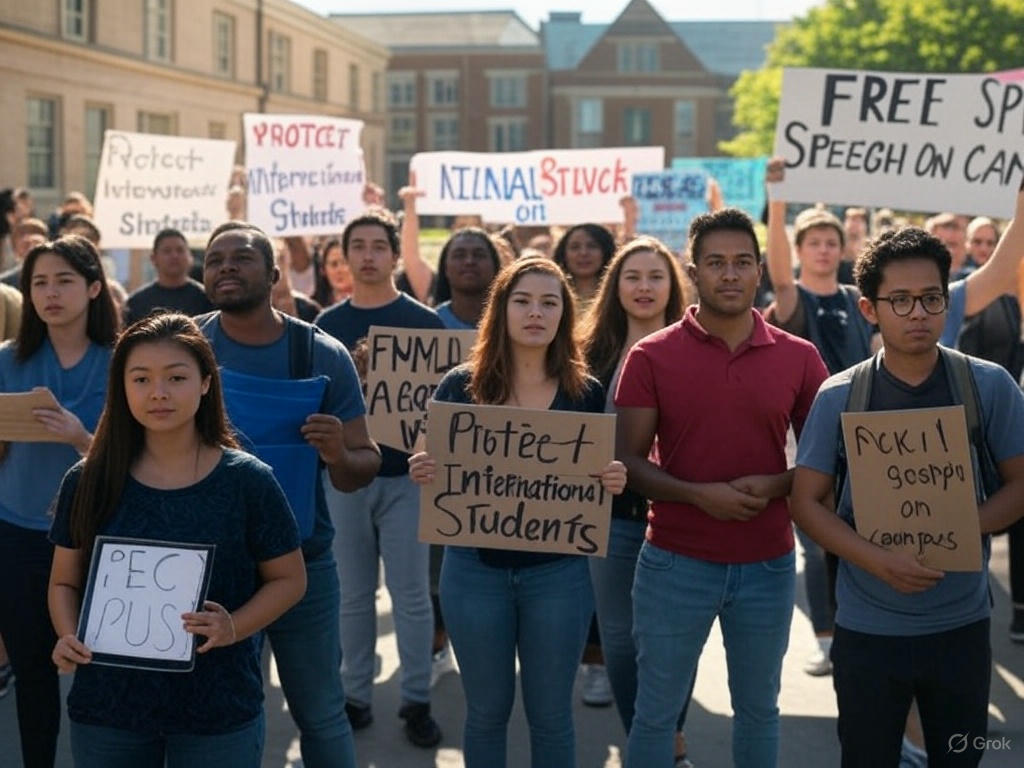Intro: A Shake-Up on Campus
Trump’s 2025 deportation plan is shaking up U.S. colleges—here’s why. Signed into action in January 2025, this bold executive order targets international students linked to U.S.-designated terrorist groups, igniting a firestorm of fear and defiance across university campuses. As college student protests erupt and administrators scramble, the policy’s ripple effects are testing the limits of free speech, immigration law, and institutional loyalty. What’s driving this move, and how are students and schools responding? Let’s break it down.
The Executive Order: Roots of Trump’s 2025 Deportation Plan
On January 20, 2025—just days into his renewed presidency—Donald Trump signed Executive Order 13987, dubbed the “Secure Campus Initiative.” Building on his campaign promise to tighten U.S. immigration policy, the order authorizes the Department of Homeland Security to deport international students found supporting groups like Hamas or Hezbollah, which the U.S. labels as terrorist organizations. The administration cites national security, pointing to a 2024 uptick in campus activism tied to Middle East conflicts. Critics, however, call it a political stunt, arguing it overreaches by targeting students with loose or unproven affiliations. Whatever the intent, the Trump deportation 2025 plan has put thousands of F-1 visa holders under a microscope, with ICE already flagging dozens of cases by early March.
Student Fears: Campus Activism Under Fire
For international students, especially those involved in pro-Palestinian groups, the stakes couldn’t be higher. Take Amina, a 22-year-old engineering major from Jordan at UCLA (name changed for privacy). She joined college student protests last fall to support Gaza relief—now she’s terrified her visa could be revoked. “I’m not a terrorist; I’m just speaking out,” she told a campus paper in February. Her story echoes across the country, from UC Berkeley to NYU, where campus activism has long been a rite of passage. A 2025 survey by the American Council on Education found 68% of international students now fear deportation over political expression—a chilling effect on free speech. For pro-Palestinian groups, the Trump deportation 2025 policy feels like a direct attack, with organizers reporting canceled rallies and hushed discussions as students weigh their futures.
University Responses: A Balancing Act
Universities are caught in the crosshairs. How do you protect international students while complying with federal pressure? Elite schools like Harvard and Stanford have issued statements pledging legal support, with Harvard’s president vowing in February 2025 to “stand by our community.” Others, like the University of Texas, are treading carefully, citing federal funding risks. Legal pledges aren’t cheap—some estimate schools could spend millions defending students in immigration courts. Meanwhile, faculty unions are pushing back, with a March 03, 2025, petition from the AAUP demanding the order’s repeal. Yet, not all campuses resist; conservative-leaning institutions like Liberty University have praised the policy as a “necessary safeguard.” This split reflects the broader polarization of U.S. immigration policy in 2025, leaving administrators navigating a minefield.
What’s Next: A Tense Spring Ahead
As spring semester ramps up, the Trump deportation 2025 plan promises more drama. Immigration lawyers predict a wave of lawsuits challenging the order’s vagueness—does a protest chant count as “support”? The Supreme Court, now firmly conservative, may weigh in by summer. On campuses, expect college student protests to grow, especially if deportations begin. For international students, the uncertainty is palpable—many are considering transfers to Canada or Europe. The policy’s long-term impact on U.S. higher education could be profound, potentially shrinking a $40 billion industry reliant on global talent. For now, all eyes are on Washington and the quad, where this clash of power and principle plays out daily.



